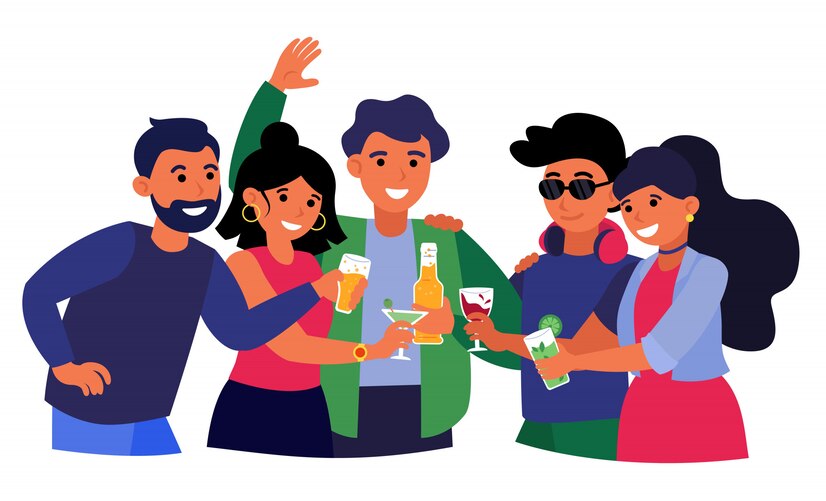
Introduction
Alcohol consumption, a prevalent social activity, has diverse manifestations from casual drinking to the severe condition of alcoholism. This comprehensive exploration aims to demystify the types of drinkers, their progression, and how intervention, particularly through a reputed alcohol rehabilitation center like Zorbawellness in Mumbai, can alter this trajectory. Recognized as the best rehab in Mumbai, Zorbawellness offers pivotal support in this journey.
1. Types of Drinkers
- Social Drinkers: Engage in occasional drinking, socially, without losing control over alcohol consumption. Social drinkers, the most common category, consume alcohol primarily in social settings, such as gatherings with friends or family. They typically drink in moderation, adhering to recommended guidelines and rarely experience negative consequences. Social drinking can enhance relaxation, foster camaraderie, and add zest to social occasions.
- Conformist Drinkers: Conformist drinkers engage in alcohol consumption to fit in with their social circle or peer group. They may not particularly enjoy alcohol but drink to avoid feeling excluded or judged. This type of drinking is often observed in younger individuals who view alcohol as a rite of passage or a symbol of maturity.
- Enhancement Seekers: Enhancement seekers utilize alcohol to intensify experiences, heighten emotions, and boost self-confidence. They may drink to feel more outgoing, adventurous, or charismatic. While enhancement seeking may initially seem harmless, it can escalate to excessive consumption and increase the risk of alcohol-related problems.
- Moderate Drinkers: Regularly consume alcohol but within limits, showing no signs of dependency.
- Heavy Drinkers: Consume substantial amounts of alcohol, risking the development of alcohol-related complications.
- Coping Drinkers: Coping drinkers turn to alcohol as a means of managing stress, anxiety, or emotional turmoil. They may view alcohol as a temporary escape from their problems, providing a sense of relaxation and numbness. However, coping with alcohol can lead to a vicious cycle of dependence, exacerbating underlying issues rather than resolving them.
- Binge Drinkers: Indulge in consuming large amounts of alcohol in short periods, aiming for intoxication, a precursor to health issues and potential addiction.
- High-Risk Drinkers: High-risk drinkers exhibit a pattern of excessive alcohol consumption that puts them at an increased risk of harm. They may drink heavily on a regular basis, experience blackouts, or engage in risky behaviors while intoxicated. High-risk drinkers often face negative consequences in their personal and professional lives due to their alcohol misuse.
- Problem Drinkers: Experience adverse effects such as health, legal, or social issues, yet may not be physically dependent on alcohol.
- Alcohol Dependent: Exhibit addiction signs, including high tolerance, withdrawal symptoms, and an inability to limit drinking.
2. Progression of Drinking Patterns
- Stage 1: Experimental/Social Use: Begins with casual or experimental drinking in social contexts.
- Stage 2: Increased Use: Escalation in the frequency and quantity of alcohol consumption, often regularizing use.
- Stage 3: Problem/Risky Drinking: The emergence of negative impacts, including health, relationships, and occupational challenges.
- Stage 4: Dependence: Development of alcohol tolerance and withdrawal symptoms during abstinence.
- Stage 5: Addiction/Alcoholism: Alcohol becomes central to life, overpowering other responsibilities and activities.
3. Identifying Warning Signs
- Growing tolerance towards alcohol.
- Secretive drinking habits.
- Neglect of duties and responsibilities.
- Deterioration of personal relationships.
- Experiencing withdrawal symptoms like tremors, nausea, or anxiety.
4. Zorbawellness: A Beacon of Hope in Mumbai
Zorbawellness, revered as the best rehab in Mumbai, stands out as a cornerstone for individuals grappling with alcoholism. As a comprehensive alcohol rehabilitation center in Mumbai, Zorbawellness offers a sanctuary for healing and recovery. They provide personalized treatment plans, encompassing both physical and psychological rehabilitation.
5. Services at Zorbawellness
- Personalized Therapy: Tailoring treatment plans to suit individual needs, acknowledging that each journey to recovery is unique.
- Group Support: Harnessing the power of community and shared experiences through group therapy sessions.
- Holistic Approach: Focusing on overall well-being, including mental, emotional, and physical health.
- Aftercare Support: Ensuring continued support post-rehabilitation to prevent relapse and maintain sobriety.
6. Seeking Help
- Early Intervention: Timely acknowledgment of early signs and seeking assistance can halt the progression to alcoholism.
- Support Networks: Groups like AA and the comprehensive care at rehab centers in Mumbai play a pivotal role.
- Professional Assistance: Therapists and rehabilitation centers, especially those specializing in drug rehabilitation in Mumbai, offer extensive recovery programs.
Conclusion
Identifying the range of drinking patterns and understanding the progression towards alcoholism are vital in tackling this issue. With facilities like Zorbawellness, the best rehabilitation center in Mumbai, offering comprehensive support, the journey from addiction to recovery is not just a possibility but a reality for many. Early intervention, supported by professional help and a strong support system, is crucial in changing the course of alcohol addiction.
